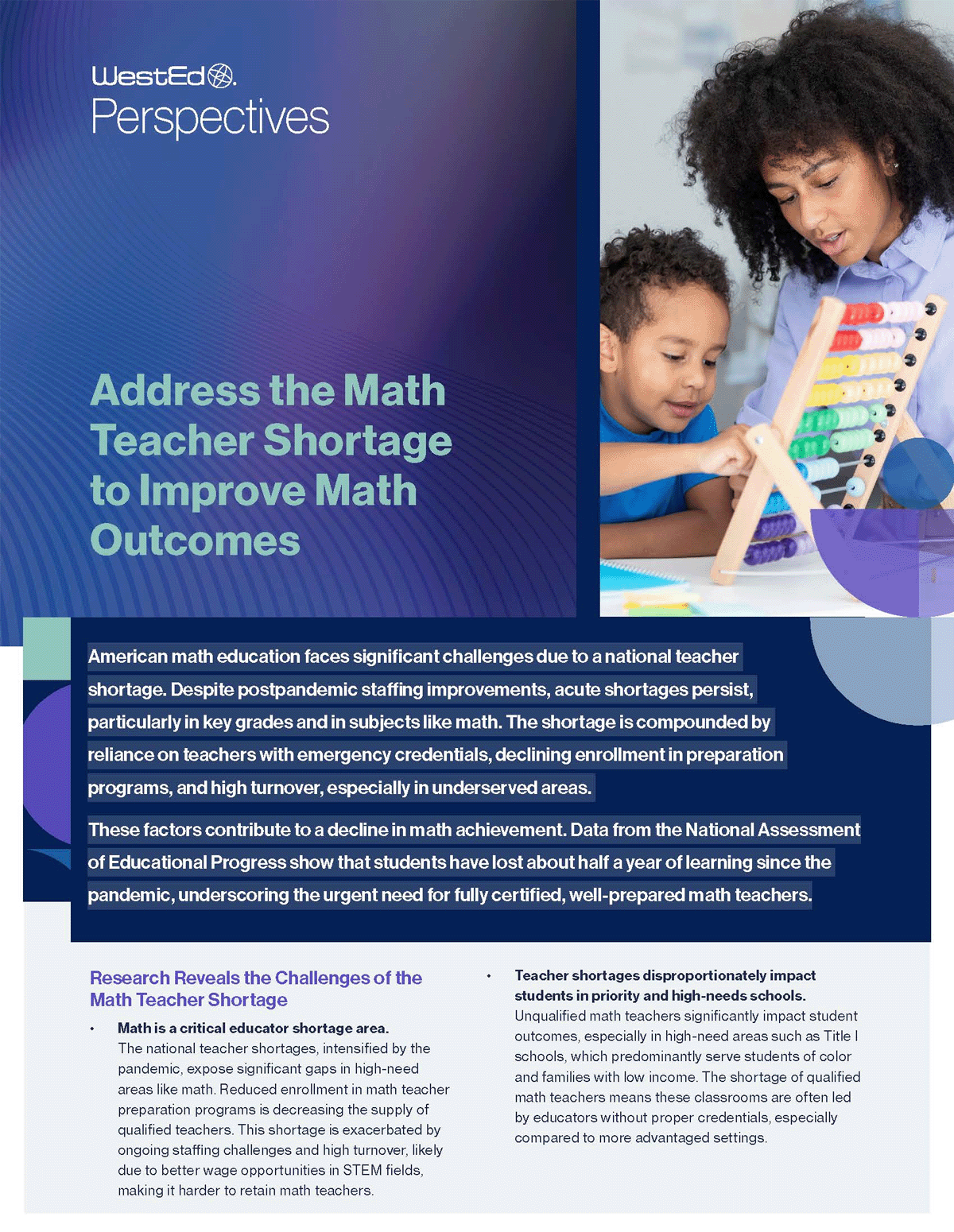Why schools benefit from investing in qualified math teachers
Everything About Competent Mathematics Educators: Their Duty in Fostering Trainee Growth and Success in Math Education And Learning
Qualified math educators are vital in forming students' understanding and admiration of mathematics. Their deep understanding and effective training strategies can significantly affect pupil outcomes. These educators not just present mathematical abilities but also foster a comprehensive environment that meets varied learning requirements. As they adopt innovative methods, the inquiry occurs: just how do these strategies especially improve pupil interaction and achievement in mathematics?
The Importance of Competent Math Educators in Education And Learning
Although lots of factors add to student success in mathematics, the presence of qualified math instructors stands apart as an important aspect in cultivating effective discovering environments. Research study continually indicates that trainees shown by instructors with strong mathematical histories often tend to demonstrate higher degrees of understanding and success. Qualified mathematics educators not only possess a deep understanding of mathematical principles yet additionally the pedagogical skills necessary to share intricate ideas in obtainable methods. They can identify trainees' individual needs and adjust their training approaches as necessary, advertising inclusivity and involvement. Additionally, their knowledge enables them to produce a favorable class atmosphere that motivates risk-taking and resilience in analytic. This helpful environment promotes a development frame of mind amongst pupils, improving their self-confidence and motivation in mathematics. In general, qualified mathematics instructors play a vital duty in shaping trainees' attitudes towards math, eventually affecting their future opportunities and scholastic trajectories.
Secret Qualities of Efficient Mathematics Educators
Effective math educators possess several crucial top qualities that enhance their training effectiveness. These include deep subject expertise, solid interaction skills, and adaptive mentor strategies that satisfy diverse understanding needs. Acknowledging and growing these attributes can greatly influence trainee understanding and engagement in maths.
Deep Subject Expertise
While a solid pedagogical technique is very important, deep subject understanding remains a cornerstone of reliable math educators. Such knowledge enables educators to comprehend mathematical principles completely and to prepare for trainee misconceptions. Educators with a solid grasp of mathematics not only provide content with self-confidence but also attach numerous topics, fostering a richer knowing environment. They are equipped to use varied training methods that satisfy different discovering styles, making complex ideas much more available. Deep subject understanding equips educators to engage in meaningful conversations with trainees, encouraging critical thinking and analytic abilities. Ultimately, the deepness of recognizing that mathematics educators have substantially influences pupils' academic growth and achievement in mathematics, laying a strong foundation for future discovering.

Strong Interaction Abilities
Deep subject understanding alone is insufficient for fostering a productive discovering setting in mathematics; solid communication skills are equally necessary for effective mathematics teachers. These skills allow educators to share intricate principles in easily accessible ways, ensuring that students understand fundamental ideas. Reliable interaction entails not just clearness but likewise the capability to actively pay attention, encouraging student participation and addressing misunderstandings. By cultivating an open dialogue, instructors create an encouraging class atmosphere where students feel comfortable asking inquiries and sharing their ideas. Furthermore, solid communicators can adjust their language and explanations to match diverse learning styles, boosting trainee interaction and comprehension. Eventually, efficient interaction bridges the space in between an educator's expertise and a student's understanding, greatly impacting academic accomplishment in mathematics.
Flexible Training Techniques
A range of adaptive training techniques are important for reliable mathematics instructors aiming to satisfy the varied requirements of their students. These methods enable teachers to tailor their guideline based on individual knowing styles, passions, and abilities. qualified math teachers. Methods such as distinguished direction, where teachers customize procedure, item, or web content, help address differing effectiveness levels. Additionally, incorporating modern technology and interactive tools can boost engagement and assist in customized learning experiences. Developmental analyses allow teachers to keep an eye on progress and readjust teaching methods accordingly. Joint team work promotes peer knowing, cultivating a supportive environment. By employing these flexible approaches, mathematics instructors can create comprehensive classrooms that urge all students to flourish and accomplish their scholastic goals, eventually fostering a love for mathematics
Ingenious Mentor Methods Utilized by Mathematics Educators
As educators seek to involve students better, ingenious mentor methods have actually arised as a focal factor in mathematics class. These methods intend to enhance understanding and retention of mathematical ideas. One famous method is making use of innovation, such as interactive software program and online simulations, which allows students to imagine complex issues and get prompt feedback.Additionally, project-based learning encourages cooperation and real-world application of mathematics concepts, promoting crucial believing abilities. Gamification, where math principles are incorporated right into game-like settings, has actually additionally gotten appeal, making finding out more pleasurable and encouraging for students.Moreover, distinguished guideline tailors lessons to fit differing skill degrees, guaranteeing that all students can proceed at their very own speed. By employing these innovative techniques, mathematics teachers produce vibrant learning experiences, ultimately promoting better trainee development and accomplishment in mathematics.
Developing Inclusive Understanding Environments
Producing inclusive discovering environments in mathematics education includes applying varied knowing approaches and cultivating joint team tasks. These methods accommodate the different demands of pupils, making sure that every person has the possibility to be successful and engage. By prioritizing inclusivity, mathematics educators can cultivate a classroom atmosphere that sustains all students.
Diverse Knowing Techniques
While numerous educators endeavor to promote inclusive discovering environments, carrying out varied understanding techniques is vital for efficiently getting to all trainees. These strategies encompass an array of mentor techniques tailored to suit differing learning styles, histories, and capabilities. As an example, including visual help, manipulatives, and technology can engage students that might fight with traditional guideline. Furthermore, set apart instruction enables instructors to modify tasks and assessments, making certain that every trainee can access the educational program at their own level. Culturally receptive rearing likewise plays a significant function in identifying and valuing link the diverse experiences of pupils, thereby enhancing their link to the material. By utilizing these diverse understanding approaches, certified math teachers can create a helpful environment where all pupils are equipped to prosper in maths.
Collaborative Team Activities

The Impact of Competent Mathematics Teachers on Pupil Success
The visibility of qualified mathematics educators substantially influences student achievement, as reliable guideline can connect gaps in understanding and foster a favorable discovering atmosphere. Research suggests that students taught by knowledgeable instructors show greater levels of efficiency in mathematical concepts compared to their peers. Qualified mathematics teachers possess a deep understanding of mathematical content, allowing them to present product in varied means that deal with various finding out styles. This adaptability not only improves comprehension however additionally enhances student self-confidence in their abilities.Moreover, qualified instructors commonly employ formative evaluations to keep track of student development, permitting timely treatments when necessary. Their capacity to create engaging lessons encourages trainee participation and advertises a growth state of mind. As a result, the influence of qualified math teachers expands beyond simple scholastic performance; it grows a sense of curiosity and durability in students, eventually leading to boosted outcomes in maths and a stronger foundation for future discovering.
Techniques for Involving Students in Math
Engaging pupils in math requires a complex strategy that incorporates diverse methods to record their rate of interest and boost understanding. One effective strategy is using real-world applications, allowing pupils to see the significance of mathematical concepts in everyday life. Including technology, such as interactive software program and on-line resources, can additionally foster engagement by supplying dynamic discovering experiences.Group work urges collaboration, making it possible for pupils to gain from each other and establish analytical skills in an encouraging environment. Furthermore, integrating games and hands-on activities can make discovering more accessible.differentiated and pleasurable direction satisfies various finding out designs, making certain that all trainees can get in touch with the product. Finally, providing prompt comments helps students identify their development and locations for improvement, fostering a growth frame of mind. By employing these methods, teachers can create an appealing mathematics class that promotes student development and accomplishment.
The Role of Specialist Development in Enhancing Math Training Abilities
While numerous educators recognize the relevance of effective mentor techniques, expert growth plays a necessary function in improving mathematics mentor skills (qualified math teachers). Continual training chances allow teachers to remain present with instructional advancements, mathematical material, and technical tools. Workshops and workshops supply forums for instructors to work together, share ideal methods, and talk about challenges they experience in the classroom.Furthermore, professional development cultivates a development attitude among teachers, urging them to review their practices and adjust their techniques based upon pupil demands. This recurring knowing process not just enhances instructors' mathematical understanding yet additionally furnishes them with cutting-edge instructional methods that can lead to boosted trainee involvement and achievement.Ultimately, an organized expert advancement program can significantly influence the top quality of math education, making sure that educators are well-prepared to influence and direct their pupils towards success in maths
Regularly Asked Concerns
What Credentials Are Required to Come To Be a Mathematics Teacher?
To end up being a mathematics educator, individuals normally require a bachelor's degree in maths or education, teaching qualification, and a solid understanding of mathematical ideas. Extra credentials may consist of specialized training in rearing and classroom management skills.

How Do Math Teachers Assess Student Development in the Class?
Mathematics instructors examine trainee progress through numerous approaches, including projects, examinations, read more and tests (qualified math teachers). They additionally use empirical analyses and trainee participation to assess understanding, adjusting instruction based on individual and team efficiency to boost learning results
What Obstacles Do Mathematics Educators Frequently Face?
Math instructors generally deal with obstacles such as differing trainee ability levels, restricted resources, educational program restrictions, and the demand to engage students efficiently. Additionally, they usually encounter pressure to boost standard test scores and manage class actions.
How Can Parents Support Their Youngster's Mathematics Education and learning?
Moms and dads can support their child's math education by offering a conducive learning setting, involving in math-related activities, urging a positive attitude in the direction of difficulties, Look At This and keeping open communication with instructors to check progress and address problems.
What Resources Are Readily Available for Math Teachers to Improve Their Abilities?
Different resources are offered for math instructors, including on the internet training courses, professional advancement workshops, peer partnership groups, academic websites, and mentor journals. These tools improve educational strategies, strengthen subject expertise, and ultimately enhance pupil understanding results in maths. Certified mathematics teachers are important in shaping pupils' understanding and gratitude of maths. Several elements add to pupil success in maths, the existence of qualified math instructors stands out as a crucial aspect in promoting efficient discovering atmospheres. In addition, certified mathematics instructors assist in these communications by purposefully organizing trainees, making certain that each group contains a mix of ability degrees and backgrounds. The visibility of certified mathematics educators substantially influences student success, as efficient instruction can connect voids in understanding and foster a positive discovering atmosphere. Math instructors commonly face challenges such as differing student skill degrees, limited resources, curriculum restrictions, and the requirement to engage students properly.